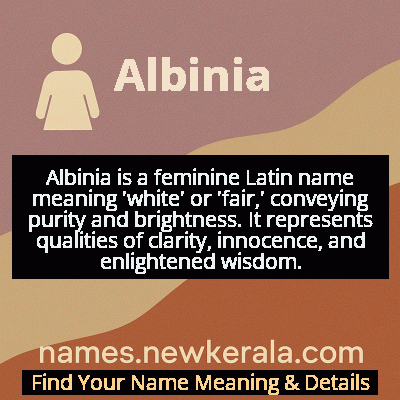Albinia Name Meaning & Details
Origin, Popularity, Numerology Analysis & Name Meaning of Albinia
Discover the origin, meaning, and cultural significance of the name ALBINIA. Delve into its historical roots and explore the lasting impact it has had on communities and traditions.
Name
Albinia
Gender
Female
Origin
Latin
Lucky Number
3
Meaning of the Name - Albinia
Albinia is a feminine Latin name meaning 'white' or 'fair,' conveying purity and brightness. It represents qualities of clarity, innocence, and enlightened wisdom.
Albinia - Complete Numerology Analysis
Your Numerology Number
Based on Pythagorean Numerology System
Ruling Planet
Jupiter
Positive Nature
Optimistic, inspirational, and creative.
Negative Traits
Scattered, exaggerating.
Lucky Colours
Yellow, gold, purple.
Lucky Days
Thursday.
Lucky Stones
Yellow sapphire.
Harmony Numbers
1, 2, 9.
Best Suited Professions
Arts, writing, communication.
What People Like About You
Creativity, optimism.
Famous People Named Albinia
Albinia Hobart
British Aristocrat
Countess of Buckinghamshire, known for her political influence and social prominence
Albinia Catherine Wherry
British Writer
Author and translator known for her works on Eastern cultures and languages
Albinia de la Mare
Scholar and Librarian
Renowned paleographer and bibliographer at the Bodleian Library, Oxford
Name Variations & International Equivalents
Click on blue names to explore their detailed meanings. Gray names with will be available soon.
Cultural & Historical Significance
Extended Personality Analysis
The name Albinia suggests a personality characterized by refinement, intelligence, and principled behavior. Those bearing this classical name are often perceived as possessing natural elegance and grace, combined with sharp intellect and analytical capabilities. They tend to be thoughtful decision-makers who value knowledge and tradition while maintaining open-mindedness to new ideas. The Latin root meaning 'white' or 'fair' implies both physical fairness and moral impartiality, suggesting individuals who strive for justice and balance in their dealings with others. Albinias typically demonstrate strong communication skills, often excelling in writing, teaching, or diplomatic roles where clarity of expression and thoughtful consideration are valued. Their classical name heritage often correlates with an appreciation for arts, literature, and history, while their modern adaptability allows them to navigate contemporary challenges with wisdom drawn from timeless principles. This combination makes them respected figures in both professional and social contexts, known for their integrity and cultured perspective.
Modern Usage & Popularity
In contemporary naming practices, Albinia occupies a niche position as a distinctive classical choice that appeals to parents seeking unique yet historically grounded names. While it has never achieved mainstream popularity in the 20th or 21st centuries, it maintains a steady, though rare, presence among families with classical education backgrounds or those drawn to Victorian-era revival names. The name's usage patterns show occasional spikes during periods of renewed interest in historical and literary names, particularly among educated urban professionals. Its current appeal lies in its combination of rarity and sophistication, offering an alternative to more common classical names like Cecilia or Augusta while maintaining similar elegant qualities. Modern Albinias often benefit from the name's distinctive nature in professional settings, where it conveys intelligence and refinement. The name's continued, though limited, usage suggests it will remain a choice for parents valuing historical depth and distinctive elegance over current naming trends.
Symbolic & Spiritual Meanings
Symbolically, Albinia embodies concepts of purity, illumination, and intellectual clarity through its Latin root meaning 'white.' This whiteness represents not merely absence of color but positive qualities of brightness, truth, and spiritual enlightenment. Across cultural traditions, white symbolizes new beginnings, innocence, and the unblemished state of potential—themes that resonate with the name's historical use in baptismal contexts. Metaphorically, Albinia suggests someone who brings light to darkness, clarity to confusion, and purity to corruption. The name also carries associations with classical wisdom and the pursuit of knowledge, connecting to the image of scholars in white robes and the ideal of truth-seeking through reason. In psychological terms, it represents the integration of tradition and innovation, combining historical depth with contemporary relevance. The symbolic richness of Albinia makes it a name that suggests not just personal qualities but a connection to broader human aspirations for truth, beauty, and moral excellence.

